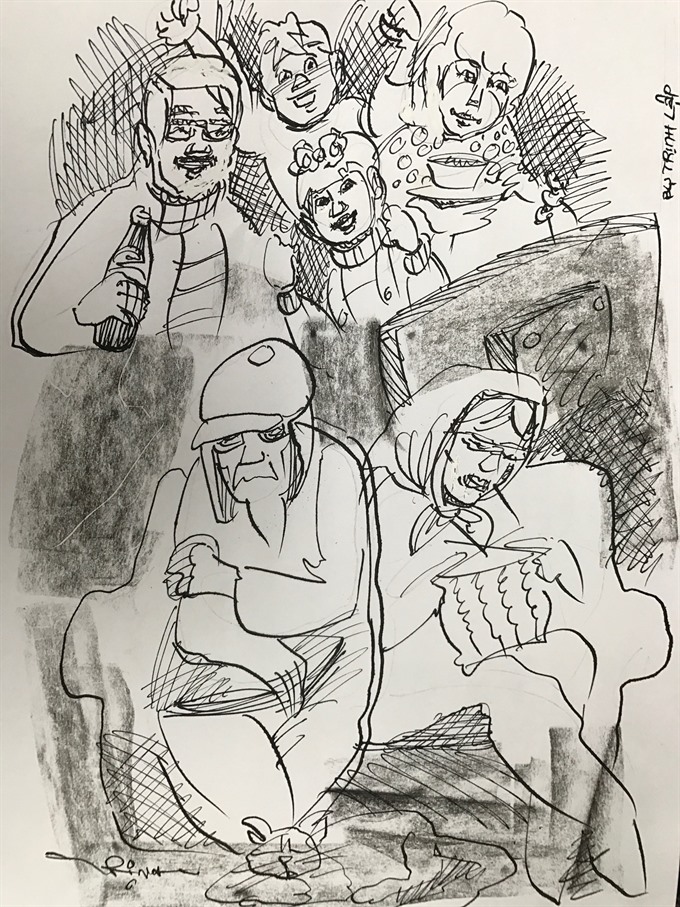 Talk Around Town
Talk Around Town

While many young people are becoming overwhelmed by and fed up with reality shows and competitions, Vietnamese senior citizens still have a limited choice of entertainment programs on television. Besides spending time with their family, doing taichi or joining elderly association, the elderly in Việt Nam spend most time at home and television is still the main means of entertainment for them.
 |
by Hồng Vân
They do their tai chi early in the morning, or dance a few waltzes in the park and join peer-group associations, but at the end of the day, they’re home most of the time, sitting in front of the TV.
And the retirees are none-too-happy with what they see on it, because the shows are mostly geared towards the younger generation.
Hà Nội resident Nguyễn Thị Tưởng, 67, says: “Since I retired, I have much more leisure time. Though I love meeting my old friends to chit chat, I still spend most of the time at home, watching TV. But it is flooded with reality shows for the young. Some programs are just too noisy and not suitable for people like me.
“I watch what the television offers, but still prefer and still wait for some entertainment programs for an older adult audience. Seeing people in their sixties and seventies sing passionately on television makes me happy. It shows that after retiring, the elderly still can lead an active life, joining and enjoying entertainment activities.”
Việt Nam Television had more than a 100 game shows and competitions as of this April, according to Việt Nam TAM (Television Audience Measurement). Among these, just a handful target older adults, like Tiếng Hát Mãi Xanh (Forever Young Singing Voice), Vui-Khỏe-Có Ích (Happy-Healthy-Helpful), Chuyện Tuổi Già (Talking about the Elderly).
Besides these programmes, seniors also join shows like Chiếc Nón Kỳ Diệu (The Magic Conical Hat), Who’s the millionaire or Việt Nam’s Got Talent, like 59-year-old Nguyễn Thanh Thúy and 83-year-old Nguyễn Thành who took the stage to sing, or 62-year-old Nguyễn Thị Nhiên who rocked the audience with her Gaengnam Style dance.
These contestants did not win big at the reality shows, but they left a deep impression on the audience for their undaunted spirit and inspirational stories. Sadly, programs where both young and old adults can perform together are not many. And contestants like Thúy, Thành and Nhiên are exceptions.
“It is a common thought that retired people are old and weak and need care from family and that their need for entertainment reduces when they get old. In reality, the senior citizens are still dedicated to the community and family and like the young people, they are active and like reality shows. The proof is in shows like Vui-Khỏe-Có ích or Tiếng Hát Mãi Xanh that receive thousands of applications every year. They join not to compete but to entertain,” film producer Nguyễn Thị Hồng Ngát told the Dân Trí newspaper.
“It’s a very wrong, conservative way of thinking that the elderly should stay at home,” said Nguyễn Trang, part of the team producing Tiếng Hát Mãi Xanh programme told Việt Nam News.
In fact, the elderly may have greater demand for entertainment than the young. They need a playground to pursue passions that they could not when they were young, whether it is dancing or singing or something else.
Tiếng Hát Mãi Xanh is one of the very few programmes for the older adult audience that has survived for more than six years. It still attracts between one to three thousand applications every year.
“It is good that over the past several years, we’ve seen many older adults actively join the community of people at same age and sing together to be young again,” Trang said.
While the senior citizens are looking forward to more suitable entertainment programmes, producers do not seem too keen.
Television agencies and game show producers are focused on entertainment reality shows and competitions for young people, because they look for ratings and advertising benefits.
“It is understandable that most producers aim at a young audience as they are the ones who use smart devices and who the advertising companies target, too,” said Trang. “Yet, it is undeniable that older adults still account for a not-so-small share of the overall audience.”
The older adult audience are mostly retired people, having more time for television programmes and fewer means of entertainment than young people, who are busy with study and work. — VNS